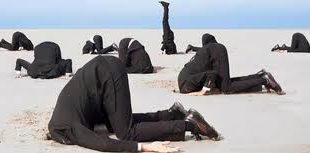Paul Romer on macroeconomics as a religious dogma [embedded content]
Read More »The dividing line between bad and good macroeconomics
The dividing line between bad and good macroeconomics If I am right that in recent decades the equilibrium in post-real macro has discouraged good science … there is some risk that a rear-guard of post-real macroeconomists will continue to defend their notion of methodological purity. At this point it is hard to know whether this group will fracture or dig in for a fight to death. If they dig in, I suspect that it will be in a few departments and that the...
Read More »James Tobin on post-real macroeconomics
James Tobin on post-real macroeconomics James Tobin explained why real business cycle theory and microfounded DSGE models are such a total waste of time. Thirty years before Paul Romer. Maybe one should start teaching some history of economic thought at economics departments again? Just a thought … They try to explain business cycles solely as problems of information, such as asymmetries and imperfections in the information agents have. Those assumptions...
Read More »Current macro debate
– The models are rubbish. – Don’t be silly. There’s a paper from the 1980s on learning effects. Jo Michell
Read More »‘Modern’ macroeconomics — a costly waste of time
‘Modern’ macroeconomics — a costly waste of time Commenting on the state of standard modern macroeconomics, Willem Buiter argues that neither New Classical nor New Keynesian microfounded DSGE macro models have helped us foresee, understand or craft solutions to the problems of today’s economies: The Monetary Policy Committee of the Bank of England I was privileged to be a ‘founder’ external member of during the years 1997-2000 contained, like its successor...
Read More »Stiglitz and the demise of marginal productivity theory
Stiglitz and the demise of marginal productivity theory Today the trend to greater equality of incomes which characterised the postwar period has been reversed. Inequality is now rising rapidly. Contrary to the rising-tide hypothesis, the rising tide has only lifted the large yachts, and many of the smaller boats have been left dashed on the rocks. This is partly because the extraordinary growth in top incomes has coincided with an economic slowdown. The...
Read More »Romer follows up his critique
Romer follows up his critique The one reaction that puzzles me goes something like this: “Romer’s critique of RBC models is dated; we’ve known all along that those models make no sense.” If we know that the RBC model makes no sense, why was it left as the core of the DSGE model? Those phlogiston shocks are still there. Now they are mixed together with a bunch of other made-up shocks. Moreover, I see no reason to be confident about what we will learn if some...
Read More »On The Role Of Economics, Trolley Problem Edition…
[unable to retrieve full-text content]On The Role Of Economics, Trolley Problem Edition…: Surge pricing is basically the economic version of the trolley problem, so we shouldn’t act like there is a simple “right” answer.
Read More »Just thought I’d share an email I received today…
Presented without comment, though I will note that sustained 4 percent growth is fairly unprecedented and I will not be adding my name. Signature Request - Statement by Economists Concerned by Hillary Clinton’s Economic Agenda Dear Fellow Economist, We are asking you to join us and other economists by signing a “Statement by Economists Concerned by Hillary Clinton’s Economic Agenda.” More than 200 economists have already signed the statement, including: Eugene Fama, University of...
Read More »Wren-Lewis trivializing Romer’s critique
Wren-Lewis trivializing Romer’s critique As yours truly wrote last week, there has been much discussion going on in the economics academia on Paul Romer’s recent critique of ‘modern’ macroeconomics. Now Oxford professor Simon Wren-Lewis has a blog post up arguing that Romer’s critique is unfair and wide of the mark in places … Paul’s discussion of real effects from monetary policy, and the insistence on productivity shocks as business cycle drivers, is...
Read More » Heterodox
Heterodox






